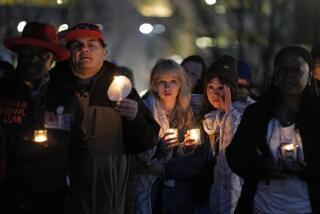Native American drummer speaks on the MAGA-hat-wearing teens who surrounded him
- Share via
The images in a series of videos that went viral on social media Saturday showed a tense scene near the Lincoln Memorial in Washington.
In them, a Native American man steadily beats his drum at the tail end of Friday’s Indigenous Peoples March while singing a song of unity for indigenous people to “be strong” in the face of the ravages of colonialism that now include police brutality, poor access to healthcare and the ill effects of climate change on reservations.
For the record:
2:55 p.m. Jan. 24, 2019This article incorrectly states that Nathan Phillips fought in the Vietnam War. Military records indicate that he served in the Marines, but not in Vietnam.
Surrounding him are a throng of young, mostly white teenage boys, several wearing Make America Great Again caps, with one standing about a foot from the drummer’s face also wearing a relentless smirk.
Nathan Phillips, a veteran in the indigenous rights movement, was that man in the middle.
In an interview Saturday, Phillips, 64, said he felt threatened by the teens and that they suddenly swarmed around him as he and other activists were wrapping up the march and preparing to leave.
Phillips, who was singing the American Indian Movement song of unity that serves as a ceremony to send the spirits home, said he noticed tensions beginning to escalate when the teens and other apparent participants from the nearby March for Life rally began taunting the dispersing indigenous crowd.
A few people in the March for Life crowd began to chant “Build that wall! Build that wall!” he said.
“It was getting ugly, and I was thinking: ‘I’ve got to find myself an exit out of this situation and finish my song at the Lincoln Memorial,’” Phillips recalled. “I started going that way, and that guy in the hat stood in my way and we were at an impasse. He just blocked my way and wouldn’t allow me to retreat.”
So, he kept drumming and singing, thinking about his wife, Soshana, who died from bone marrow cancer nearly four years ago, and the various threats that face indigenous communities around the world, he said.
“I felt like the spirit was talking through me,” Phillips said.
The encounter generated a wave of outrage on social media less than a week after President Trump made light of the 1890 Wounded Knee massacre of several hundred Lakota Indians by the U.S. cavalry in a tweet that was meant to mock Sen. Elizabeth Warren (D-Mass.), whom Trump derisively calls “Pocahontas” because she has cited Native American ancestry.
In a statement, the Indigenous Peoples Movement, which organized Friday’s march, called the incident “emblematic of our discourse in Trump’s America.”
“It clearly demonstrates the validity of our concerns about the marginalization and disrespect of indigenous peoples, and it shows that traditional knowledge is being ignored by those who should listen most closely,” Darren Thompson, an organizer for the group, said in the statement.
Rep. Deb Haaland (D-N.M.), who with Rep. Sharice Davids (D-Kan.) became the first Native American women elected to Congress in 2018, said the video was difficult to watch.
“To see a group of students from a Catholic school who are practicing such intolerance is a sad sight for me,” Haaland said.
Some of the teens in the video wore sweatshirts from Covington Catholic High School in Park Hills, Ky., which sent students to Washington to participate in Friday’s antiabortion March for Life event, according to an archived page of the school’s website that was taken down on Saturday.
On Saturday, school officials and the diocese of Covington released a joint statement:
“We condemn the actions of the Covington Catholic High School students towards Nathan Phillips specifically, and Native Americans in general,” the statement said.
“The matter is being investigated and we will take appropriate action, up to and including expulsion.”
Chase Iron Eyes, an attorney with the Lakota People’s Law Project, said the incident lasted about 10 minutes and ended when Phillips and other activists walked away.
“It was an aggressive display of physicality. They were rambunctious and trying to instigate a conflict,” he said. “We were wondering where their chaperones were. [Phillips] was really trying to defuse the situation.”
Phillips, an Omaha tribe elder who fought in the Vietnam War and now lives in Michigan, has long been active in the indigenous rights movement.
A co-founder of the Native Youth Alliance cultural and education group, he shows up to Arlington National Cemetery every Veterans Day with a peace pipe to pay tribute to Native Americans who served in the U.S. military.
“My job has always been taking care of the fire, to keep the prayers going,” Phillips said.
In that role, he has encountered anti-Native American sentiments before: In 2015, Phillips was verbally attacked by a group of Eastern Michigan University students who were dressed as Native Americans during a theme party near the town of Ypsilanti, according to news reports.
Phillips had approached the group, informing them that their celebration was racially offensive, a local Fox News station reported. One of the students threw a beer can at him, Phillips told the news outlet.
But the incident on Friday, combined with the ensuing attention from media outlets scrambling to get his story, left him shaken.
“I’m still trying to process what happened,” Phillips said. “I’m feeling a little bit overwhelmed.”
Still, he said, he hopes the teens will find a lesson in all of the negative attention generated by the videos.
“That energy could be turned into feeding the people, cleaning up our communities and figuring out what else we can do,” Phillips said. “We need the young people to be doing that instead of saying: ‘These guys are our enemies.’”
Antonio Olivo, Cleve R. Wootson Jr. and Joe Heim write for the Washington Post.
More to Read
Get the L.A. Times Politics newsletter
Deeply reported insights into legislation, politics and policy from Sacramento, Washington and beyond. In your inbox three times per week.
You may occasionally receive promotional content from the Los Angeles Times.








